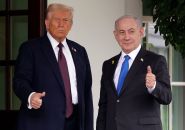- Home
- Middle East
- What Does an ICC Arrest Warrant Entail?

©DANNY KEMP / AFP
Nearly six months after its prosecutor, Karim Ahmad Khan, announced the request, the International Criminal Court (ICC) on Thursday issued arrest warrants against Israeli Prime Minister Benjamin Netanyahu, his former Defense Minister Yoav Gallant and the leader of Hamas' military wing, Mohammed Deif. The charges stem from their responsibility for "war crimes" and "crimes against humanity" committed since October 7, 2023.
This ICC decision could have severe consequences for the three individuals, especially in terms of international relations. To recap, an ICC arrest warrant is a judicial decision issued to apprehend a person accused of crimes within the court’s jurisdiction, such as war crimes, crimes against humanity or genocide.
The warrant is issued when the ICC deems there is sufficient evidence to justify the charges and when an arrest is necessary to ensure the accused appears in court, prevent ongoing criminal activity, or protect the investigation and victims. This decision significantly affects the movements of the targeted individuals.
Diplomatic and legal restrictions
States that are party to the Rome Statute (the ICC's founding treaty) have a legal obligation to cooperate with the court, which includes arresting and surrendering the accused if they are found on their territory.
A leader targeted by an ICC warrant could therefore be arrested if they travel to a country that recognizes the court’s authority. While not all states are members – for example, Russia, China, Israel and the United States are not – such a warrant can lead to political isolation on the international stage.
Leaders subject to these warrants may be seen as international pariahs, limiting their diplomatic engagements. In practice, this forces them to restrict their travel to non-member states or those that do not actively cooperate with the ICC. They are thus compelled to avoid international conferences or events in states where they risk arrest.
Challenges and limitations
That, at least, is how things work on paper. In practice, such decisions often clash with state interests and garner varied levels of international support. Some countries may ignore ICC warrants for geopolitical or economic reasons, thereby providing "safe havens" for targeted leaders.
For instance, in March 2023, the ICC issued an arrest warrant against Russian President Vladimir Putin over accusations related to the deportation of Ukrainian children. While this limited his travel to ICC member states, several of Russia's allies disregarded the warrant, highlighting the ICC’s practical limitations in a tense geopolitical environment.
This was notably the case with Mongolia, a signatory to the Rome Statute, in September 2024. Landlocked between Russia and its ally China, and with little geopolitical leeway, Mongolia risked angering its two powerful neighbors. As a result, the Russian president faced no issues during a two-day visit there.
Travel constraints for Netanyahu?
Much like Putin, the Israeli prime minister will now face greater difficulties traveling internationally. France and the Netherlands, two ICC member states, have confirmed they would comply with the court’s decision. Consequently, it is unlikely that Netanyahu or Gallant will travel to these countries – at least, not under their current governments.
However, they are unlikely to face issues when traveling to the US, Israel's main ally. Beyond the fact that Washington is not an ICC member, the Biden administration, which swiftly denounced the court's decision, had even threatened sanctions against the ICC if it issued such arrest warrants.
These accusations were echoed by a dozen Republican senators, including Marco Rubio, who will become Secretary of State in January under the new Trump administration. Another member of the incoming administration, future National Security Advisor Mike Waltz, stated on X that “a strong response to the ICC and UN’s anti-Semitic bias” can be expected in January.
While an ICC arrest warrant sends a strong message about the criminal responsibility of targeted leaders, its enforcement remains challenging in practice. It is both a legal tool and a political act, aiming to hold leaders accountable for serious crimes while having a practical impact that often depends on international alliances.
Read more




Comments